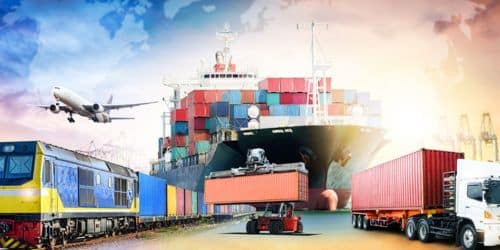Have you ever used the services of a freight company, or are you thinking of launching or expanding your own freight company? It’s important to understand that freight businesses’ primary function is to transport goods from one location to another. Packing, customs clearance, and storage are just some of the extra services that many freight transportation companies now offer. So that you may make a well-informed choice, let’s have a look at the best shipping companies and freight forwarders of 2023.
What is a Freight Company
Products, goods, or merchandise that are transported by ship, rail, airline, truck, or van are referred to as freight. Freight companies are businesses that focus on transporting freight or cargo from one location to another (sometimes known as “forwarding”). These businesses are broken up into various sections. For instance, domestic freight forwarders move commodities within a single nation, while international freight forwarders move items over international borders.
Again, a company that organizes commercial transportation for the cargo of other businesses is known as a freight forwarder. Depending on the trade and transport arrangements negotiated, such as the corporate terms from the International Chamber of Commerce, the freight forwarder typically bears responsibility for shipments until they reach their destinations.
Understanding Freight Company
Since the 18th Century, the business of freight forwarding has been in existence and various companies over the years have sprung up and established themselves profitably in the sector. In the past, freight forwarders acted as simple middlemen, organizing the shipping of products on behalf of their clients.
The best tariffs and routes would be negotiated with ship captains and owners, and port officials would be consulted to guarantee that the cargo reached its destination safely. With time and the growth of trade, freight companies/forwarders began to specialize in various goods and transportation methods.
In recent times, freight companies have become much more involved in the transportation of products, and as a result, their position has grown far more important. They are in charge of arranging the entire shipping procedure from the origination location to the destination point. By taking into account variables like cost, travel time, and the nature of the products being carried, they collaborate with shippers to choose the optimum route for the shipment.
In order to guarantee that the goods are delivered promptly and safely, they also collaborate with carriers. Additionally, freight forwarders today provide a variety of value-added services, including packing, customs clearance, and warehousing. Freight companies employ multiple means to transport commodities, including rail, road, sea, and air. Some businesses provide multi-modal solutions, which simply implies that they provide multiple services, frequently air and sea and occasionally air, sea, and road. Inter-modal shipping is the most popular type of multi-modal shipping and refers to the process of truck collection, rail delivery, and truck delivery.
Services Provided by Freight Companies
Depending on the business, shipping companies offer a variety of services, but the majority offer a full range of services that include:
- Packaging: Depending on the final destination, transport companies will help the shipper decide how best to package their goods. Packaging for a straightforward in-state delivery differs from that for shipments going abroad or those that will be kept for an extended period of time.
- Labeling: A freight company also provides assistance with labeling, taking into account any unique needs for overseas goods.
- Documentation: The documentation needed for shipping can be challenging. Freight companies can assist a shipper in drafting invoices, bills of lading, inspection certificates, and export licenses, among other sorts of paperwork.
- Transportation and tracking: Freight companies are also responsible for arranging for the pickup, delivery, and tracking of consignments. Also providing tracking information to help customers monitor the status of their shipment.
- Warehousing: The freight forwarding company will assist in setting up warehouse locations if the goods need to be stored while being transferred between transportation companies.
- Customs and Insurance: Freight Companies, help to coordinate with customs officials for the country in which they are moving goods to or from, to ensure compliance with regulations. Also, in the event of damaged products, the freight forwarder will offer insurance protection, shielding the shipper from liability.
Key Stages Involved in Freight Forwarding
#1. Export haulage
This is the initial phase of the entire shipping process. This happens when a transportation firm delivers goods from a business to the warehouse of a freight forwarder/company. The method of transportation often involves a truck, but it also depends on the type of cargo being shipped by the company and how far it is to the warehouse. Depending on how well the trip goes, the goods could be late by a few hours or even a few days.
#2. Export customs clearance
Customs officials in the product’s country of origin must authorize the shipment’s departure before it can enter another nation. Agents may examine both the product and the supporting papers to ensure that they are consistent. Before permitting the product to leave the country, they also verify its legality and safety. Generally, freight forwarders often use customs agents to take care of this part of the process.
#3. Product checkpoint
The unloading of the products into the warehouse by the receiving crew constitutes the product checkpoint, sometimes referred to as origin handling. They check the goods to make sure they arrived undamaged and verify that they line up with the order’s booking records. The freight handling staff additionally ensures the approval of the packages where they are going. Particularly if they’re traveling to a nation other than their own, certain products are subject to restrictions. Some restricted products include:
#4. Flammable liquids:
Due to the inherent risks, there are tight guidelines for the shipment of gasoline, lighter fluid, acetone, and even perfume.
#5. Drugs:
Freight companies don’t carry illegal drugs since pharmaceuticals frequently need climate-controlled shipping methods.
#6. Alcohol:
States and countries have different alcohol laws, thus freight forwarders must adhere to certain guidelines while shipping alcoholic beverages.
#7. Dangerous Items:
Products like knives and other sharp objects might be dangerous for those who handle packages and as such require special handling.
#8. Perishable Items:
To ensure that perishables like fresh food reach in top shape, express shipping is necessary.
#9. Import customs clearance
Authorities verify that the paperwork given by freight forwarders matches the merchandise when the shipment reaches its country of destination. They make sure the item complies with all legal standards for importation as well. Fees levied by import customs agents occasionally are covered by the freight forwarder on behalf of the shipper and billed separately.
#10. Destination arrival and handling
The product is prepared for shipment to its destination by a transportation company contracted by the freight forwarders once the shipment clears import customs. The freight company receives paperwork for the shipment which may include the following;
- Invoices
- Bill of Lading certificate
- Export packing list, license, and declaration document
- Certificate of origin
- Inspection certificate
At the completion of the products’ inspection, it is loaded and transported to the import warehouse.
#11. Import Haulage
Import hauling is the name for the last part of the process. This stage is over when the product leaves the import warehouse and goes to its final site. Freight forwarders may select one or more modes of transportation, similar to export haulage, depending on the product and the distance from the warehouse to the destination. The distance traveled and the form of transportation decide how long the import haulage takes, but the recipient typically receives their package anywhere from a few hours to a few days after it leaves the warehouse.
Benefits of Using Freight Companies
#1. Convenience:
Freight companies make shipping of goods especially internationally simple and easy, by handling all the necessary logistics required to ship the products. They get all required insurance and paperwork, offer storage and warehousing options for the shipper, and keep their clients updated on the status of each shipment. Also, by providing a single invoice for all services combined, freight forwarders make it simpler for businesses to handle their freight.
#2. Cost savings:
Due to their connections with transportation companies, freight forwarders frequently receive special pricing. This helps the shipper save costs and avoid unnecessary expenses.
#3. Expertise:
Freight companies advise their clients on potential issues and have a wealth of expertise in the shipping business.
Ocean Freight Company
The process of transporting containerized cargo carried onto ships at sea is known as ocean freight. Ocean freight companies are those companies that specialize in transporting cargo or freight via cargo ships. Ocean freight companies enable shippers to move massive amounts of goods between countries through the ocean.
There are different kinds of shipping options available, but the most popular option used by ocean freight companies is container shipping or containerization. This is the practice of moving ingredients, raw materials, parts, and completed goods from one location to another utilizing specialized container assets, often known as shipping containers. The available options for shipping containers are in standard sizes of 20 to 40 feet.
Container shipping is one of the most popular choices for ocean freight companies because it is safe and easy to handle. Even though they are only good for certain kinds of goods, these bins are easy to move without affecting the goods inside.
Ocean freight companies offer two types of services under container shipping. They are LCL – Less than container load and FCL – Full container load.
Ocean freight companies, pick up the products, properly arranges for them to be loaded and boarded for shipping, and then successfully deliver them to the final destination.
Pros of Ocean Freight Companies
Some pros of ocean freight companies include;
- Higher shipping capacity: Bulky cargo is best transported by Ocean freight. Only lighter goods that are not being transported in bulk can benefit from alternative shipping methods.
- Cheaper costs: Overall, ocean freight is much cheaper than other options.
- Fewer restrictions: There are a number of limitations on the kinds of goods you can ship using air freight companies. For instance, you cannot ship biological goods like some pharmaceuticals or combustible goods like perfumes by air freight. Fewer limitations apply to ocean shipping.
- Lower carbon footprint: Ocean freight produces far less carbon footprint than air freight.
Cons Associated With Ocean Freight Companies
- Ocean freights take longer time to in comparison to other shipping modes.
- There is risk of customs delays and port congestion which further delays delivery time.
- Goods have less protection and are susceptible to damage due to the long shipping route.
- Products have a higher risk of being mishandled and or misplaced.
Freight Company Quote
Freight shipping quotes typically depend on a number of costs, like the price per pound of goods and the amount of space they take up. Other factors that make up the quote will include;
- Insurance: Depending on the particular item being shipped and its value a level of insurance is needed in case of unforeseen incidents during shipping.
- Customs Security Surcharge: This fee, which is only applicable to air freight, pays for additional security measures ordered by the airport authority.
- Container freights station: This fee is charged to shippers whose products are LCL (Less than container load) for the stations handling these types of container loads.
- Pickup and delivery at ports and warehouses: These factors are also considered when calculating the freight shipping quote.
- Customs brokerage: Fees for customs brokerage firms to facilitate the shipment of goods across borders.
- Exchange rates: Exchange rates also affect freight quotes, especially for international shipping.
- Size of the shipment: Large shipments will obviously require more work, and cost more than smaller shipments.
- Supply and demand: Festive holidays and public holidays, lead to a reduced workforce, and as such freight rates are higher on such days.
- Type of vessel: Container ships are cheaper than tankers for liquid cargo or bulk carriers for non-packaged dry goods.
- Mode of shipping: The mode of shipping also affects the quote as air freights are relatively more expensive than ocean freights.
- Routing fees: This covers a number of freight-related incidental charges and transport charges.
- Fuel additional fees: Any additional fuel fees.
Best Freight Shipping Companies
Worldwide, there are tens of thousands of freight shipping companies. Below is a list of some of the best in the shipping sector.
#1. MSC – Mediterranean Shipping Company
It was founded in 1970 and is a Swiss international cargo firm. With a vessel line-up of over 645 container ships, the company is rated to be one of the most extensive cargo firms globally with a TEU capacity of approximately 4,287,473 TEU. In the last year, MSC acquired almost 100 ships to its fleet through a buying binge of both brand-new and used boats.
#2. APM-Maersk
Denmark-based Maersk Shipping Line, a shipping company, held the top rank in the global container shipping market for more than 25 years. An AP Moller-Maersk corporation division is Maersk Shipping Line. The Maersk Line made its entry into the international container shipping market in 1904 and is well-known for its fleet of container ships.
The corporation is currently expanding its market share in the digital technology and green fuel sectors. The firm now has a fleet of about 738+ container ships with a total TEU (Twenty-Foot Equivalent Unit) capacity of about 4,275,542.
#3. CMA-CGM
CMA-CGM, the top container shipping firm in France, took fourth place in the previous year (2021). It is now the third-largest company in terms of TEU capacity thanks to the addition of new mega-ships to its fleet. As a result of a number of mergers involving previously established maritime businesses, CMA CGM was created in the year 1978.
The company’s founder, Jacques Saade, played a crucial role in bringing it into full functioning. The company currently operates more than 568 ships on more than 150 routes throughout the world. It is capable of transporting about 3,198,217 TEU.
#4. COSCO – China Ocean Shipping Company
In terms of container shipping businesses, one of the top conglomerates is the China Ocean Shipping Company, or COSCO as it is more commonly known. This year, CMA CGM knocked COSCO down to fourth place. COSCO operates in 40 different countries and has a fleet of over 480 container ships with a 2,932,779 TEU container carrying capacity. However, the company’s capacity will increase in the upcoming year thanks to an additional 5,85,000 TEU in its order book.
#5. Hapag-Lloyd
One of the most well-known and prominent worldwide shipping businesses is the German-based Hapag-Lloyd. The Hamburg-American Line and the North German business Lloyd merged to form the corporation in 1970. Currently, the shipping company operates over 250 ships with a global TEU container carrying a capacity of around 1,743,983.
#6. ONE – Ocean Network Express
One Network Express, which was founded on July 7th, 2017, combines MOL, “K”-Line, and NYK, three significant shipping businesses. ONE was established in Japan with its headquarters in Singapore to improve services across Asia, Latin America, and Africa. With a combined fleet of 209 ships and a container carrying capacity of 1,531 530 TEU, these three businesses’ partnership is currently one of the largest container shipping alliances in the world.
However, there is a 2% decrease in TEU capacity compared to 2021, primarily as a result of the decline in the number of contracted boats.
#7. Evergreen Line
Dr. Yung-Fa Chang, a visionary in his own right, formed the Evergreen Marine Corporation, a maritime corporation with its headquarters in Taiwan, in 1968. The company currently operates more than 204 container ships, with a total carrying capacity of 1,477,644 TEU, and offices located all over the world. One of the biggest cargo shipping firms in the world, according to popular opinion. The largest container ships in the world are currently in the fleet of Evergreen Line.
#8. Hyundai Merchant Marine
With a fleet of 75 ships and a cargo-carrying capacity of more than 819,790 TEU, HMM Co. LTD., formerly known as Hyundai Merchant Marine, is a prominent container shipping company with headquarters in South Korea. As one of the top 10 shipping companies in the world, HMM Co. LTD. moves the majority of South Korea’s exports. As a leading integrated logistics company globally, HMM Co. LTD. plays a significant role in Korea’s economic development.
What Does a Freight Company Do?
A Freight company is a company that specializes in the moving (or “forwarding”) of freight, or cargo, from one place to another
What Does Freight Cost?
Freight cost is how much you pay a carrier company to move things from where they start to a location you agree on. It varies based on a number of factors.
What Should I Charge for Freight?
Your charge for freight should depend on your average shipping cost per package. You can get this amount by adding up the total cost of shipping your packages for a month and then dividing the result by the number of packages you shipped in the same time period.
Conclusion
In the upcoming years, it is anticipated that the freight shipping sector would expand exponentially. This is a result of the economy’s globalization and e-commerce’s ongoing rise. A lot of processes are also likely to become digital, which will make them less cumbersome, easier, faster, and more efficient.
Freight Company FAQs
What type of business is freight?
Freight is a transport business.
Who pays for freight?
The buyer is responsible and pays for all freight charges.
Is UBER freight real?
Yes, UBER freight is real.






